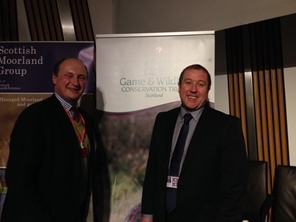 The case for grouse moor management as an essential part of sustaining Scotland’s uplands was re-stated at a “Gift of Grouse” reception yesterday at the Scottish Parliament, highlighting the work of grouse moor estates in the Angus Glens and Perthshire.
The case for grouse moor management as an essential part of sustaining Scotland’s uplands was re-stated at a “Gift of Grouse” reception yesterday at the Scottish Parliament, highlighting the work of grouse moor estates in the Angus Glens and Perthshire.
Adam Smith, Director Scotland, the Game & Wildlife Conservation Trust (GWCT), which has, since the mid 1980s, produced more than 120 peer- reviewed papers on moorland issues, reiterated the benefits of management for grouse saying:
“There is no question to GWCT Scotland that well conducted management for grouse shooting can be a force for good in our uplands. Its demise would pose significant challenges for the landscape, for nationally important biodiversity conservation, and many small but locally important rural economies.
“GWCT feels however that there is room for improvement; we believe where grouse densities are at levels which can sustain shooting and predation pressures, these moors can and should host diverse bird of prey populations. We also feel that grouse moors should play a greater role in protecting and enhancing peat storage, thus capturing carbon and water.”
Adam Smith said that while it was possible to achieve net beneficial change, this would require balances to be struck – in terms of sustainable bird of prey populations, re-wetting peat land to the detriment of grazing quality, and for gamekeepers to better judge the need for medicating wild animals. He said:
“Change is not always a net gain. If we accept that Scotland needs moorland, new processes in thinking in both management and public policy are needed. Critically there must be a shift in perception that moorland management is limiting and extractive to accepting that it contributes provisioning, regulating and cultural services. Grouse moors are an interlinked part of the suite of upland land uses, including forestry and livestock farming, which have a role in the sustainable future for the uplands.”
GWCT has produced a new pack of position documents titled Sustaining Scotland’s Moorlands. These bring together inter-related headings and topics where GWCT has a position based extensive research in this area. Download them here >>
Further information from: Adam Smith, Game & Wildlife Conservation Trust, Tel: 01738 551511, Email: asmith@gwct.org.uk
Issued by: Dick Playfair, Playfair Walker, Tel: 0131 445 5570, Email: richard@playfairwalker.com
Supplementary notes
GWCT research has shown that:
- The conservation status of ground nesting species such as waders and mountain hare is better on managed than unmanaged moorland (Mamm. Rev and J. Appl Ecol 2010)
- Heather moorland is retained and restored by keeping driven grouse shooting (Wildl. Biol. 2001)
- Lichen diversity can be enhanced by the varied structure on managed moorland (Appl Veg Sci 2008)
- Ticks which spread disease to humans, livestock and wildlife are controlled by moorland managers (Med. Vet. Entomol. 2012)
- Managed heather burning can reduce extreme wildfire incidents (J. Biod. Sci. Manage 2008)
- Driven grouse shooting is an important source of employment and investment in remote rural areas (Fraser of Allander 2010)
- Moorland management can enhance carbon storage and the provision of clean water (J. Hydrol. 2012)
Notes to editors
The Game & Wildlife Conservation Trust is an independent wildlife conservation charity which carries out scientific research into Britain’s game and wildlife. We advise farmers and landowners on improving wildlife habitats. We employ 22 post-doctoral scientists and 50 other research staff with expertise in areas such as birds, insects, mammals, farming, fish and statistics. We undertake our own research as well as projects funded by contract and grant-aid from Government and private bodies. The Trust is also responsible for a number of Government Biodiversity Action Plan species and is lead partner for grey partridge and joint lead partner for brown hare and black grouse.
For information, contact:
Playfair Walker
Telephone: 0131 445 5570
Email: richard@playfairwalker.com